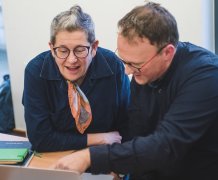Articles

Exeter's high-profile Arts and Culture group has announced the latest Creative Fellowships, which will run until the summer of 2020.
Magic Lanterns, Movement and Mental Wellbeing key themes for new Arts & Culture Fellowships
Magic lanterns, movement and mental wellbeing are among the key topics to be explored by the next generation of extraordinary collaborations between academics and artists at the University of Exeter.
The University’s high-profile Arts and Culture group has announced the latest Creative Fellowships, which will run from now until the summer of 2020.
The Fellowships provide a pivotal path to encourage illuminating and pioneering arts projects between renowned creative practitioners and innovative researchers at the University.
The latest cohort of Creative Fellowships will explore the magical world of Victorian popular culture, the relationships between music and body movement, and the crucial role that the natural environment can play in wellbeing.
Sarah Campbell, Associate Director for Arts and Culture at the University of Exeter said: “The Arts and Culture team here at Exeter is passionate about bringing people together, across disciplines and areas of expertise, to encourage new ways of working and thinking.
“The Creative Fellowships really put this principle into practice, and we are thrilled to be welcoming such exceptional and thought-provoking artists, and look forward to sharing their stories and those of their academic hosts.
“New ideas take time, and we hope that these Creative Fellowships provide that time - to see one’s own discipline through fresh eyes, and to gain inspiration from other creative people.”
For the Fellowship entitled Embodied Viewing: Peepshows, Panoramas, Magic lanterns and Victorian Optical Devices, independent choreographer, filmmaker and artistic director Lea Anderson will be based at the Bill Douglas Cinema on the Streatham Campus.
Working with Professor John Plunkett, she will explore the collection with a particular focus on peepshow and Victorian lens-based devices.
Lea said: “I have a special interest in working with museums and collections, and I am particularly focused on ways to present objects and ideas in new and engaging ways. This fellowship is a refreshing opportunity to find new ways into a subject in collaboration with open-minded people and I am excited to discover what each discipline can offer each other. Artists need more spaces like this!’
For the Fellowship Human Movement: Translating Data in Art, musician and scientist Domenico Vicinanza will explore research into movement coordination and changes in movement patterns during learning and over our lifespan.
Based at the St Luke's campus, he will be working with Sports and Health Sciences Lecturer Dr Genevieve Williams and the team involved with the VSimulators project, to explore data from this unique human-structure interaction, in order to create an engaging creative representation of its science using sound.
Domenico, who has previously worked with CERN and NASA to create music from scientific data said: “'This fellowship is a wonderful chance to continue exploring the relationship between music and science with the exceptional opportunity to work in a multidisciplinary team of experts and using a unique facility like VSimulators.
“This project collaboration aims to create music that will inherit the complexity, structures and unique properties of this unique infrastructure and its interactions with human movements.”
In Cornwall, the Fellowship Public Involvement in Public Health Research Knowledge Mobilisation will see visual artist Alex Julyan work with Dr Kath Maguire and researchers from the European Centre for Environment and Human Health, members from the Health and Environment Public Engagement group and My Blue Health.
The Fellowship will focus on the themes of land, water and air, and explore emotional attachments and personal meanings that connect people to outdoor places with water.
Alex said: “This fellowship focuses on the processes that connect researchers and their work in health and environment to the public and their relationships with bodies of water. I will be putting creative methods into the mix to engage researchers and participants in new kinds of conversations and exchanges. I am here to catalyse ideas, shake up imaginations and make creative connections.”
The Fellowships are a key part of the University of Exeter’s Arts and Culture strategy, which aims to ‘place creativity at the heart of all we think, imagine and do together’.
The Fellowships provide an important mechanism for putting these ambitions into practice, offering creative practitioners the opportunity to engage with innovative research across the University’s colleges and campuses.
The Creative Fellows will be working will their hosts for a period of between 4 -5 weeks between November 2019 – February 2020 with any events or activities running between March-July 2020.
Date: 17 December 2019
